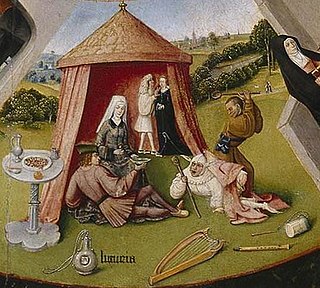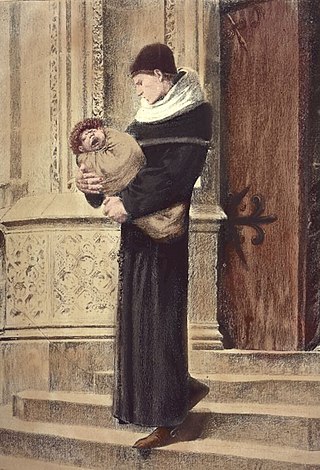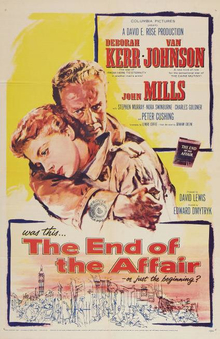
Lust is an intense desire for something. Lust can take any form such as the lust for sexuality, money, or power. It can take such mundane forms as the lust for food as distinct from the need for food or lust for redolence, when one is lusting for a particular smell that brings back memories. It is similar to but distinguished from passion, in that properly ordered passion propels individuals to achieve benevolent goals whilst lust does not.

The Monk: A Romance is a Gothic novel by Matthew Gregory Lewis, published in 1796 across three volumes. Written early in Lewis's career, it was published before he turned twenty, and he withheld his name from the first edition. It tells the story of a virtuous monk who gives into his lustful urges, setting off a chain of events that leave him damned. It is a prime example of the type of Gothic that specializes in horror.

The Professor, A Tale. was the first novel by English author Charlotte Brontë. It was written in 1846 before Jane Eyre, but was rejected by many publishing houses. It was eventually published, posthumously, in 1857, with the approval of Charlotte Brontë's widower, Arthur Bell Nicholls, who took on the task of reviewing and editing the text.
In Christian hamartiology, eternal sin, the unforgivable sin, unpardonable sin, or ultimate sin is the sin which will not be forgiven by God. One eternal or unforgivable sin, also known as the sin unto death, is specified in several passages of the Synoptic Gospels, including Mark 3:28–29, Matthew 12:31–32, and Luke 12:10, as well as other New Testament passages including Hebrews 6:4–6, Hebrews 10:26–31, and 1 John 5:16.

Claude Frollo is a fictional Christian clergyman and the primary antagonist of Victor Hugo's 1831 novel The Hunchback of Notre-Dame. He is also an alchemist, Renaissance humanist, and intellectual. In his decision to choose a Roman Catholic priest as the primary villain of his novel, Hugo was very much under the influence of the anti-religious currents of the Enlightenment.

The Sandpiper is a 1965 American drama film directed by Vincente Minnelli and starring Elizabeth Taylor and Richard Burton, the third of eleven films starring the power couple.

The End of the Affair is a 1955 British-American drama romance film directed by Edward Dmytryk, based on Graham Greene's 1951 novel of the same name. The film stars Deborah Kerr, Van Johnson, John Mills and Peter Cushing. It was filmed largely on location in London, particularly in and around Chester Terrace. The film was entered into the 1955 Cannes Film Festival.

"Revelation" is a Southern Gothic short story by author Flannery O'Connor about the delivery and effect of a revelation to a sinfully proud, self-righteous, middle-aged, middle class, rural, white Southern woman that her confidence in her own Christian salvation is an error. The protagonist receives divine grace by accepting God's judgment that she is unfit for salvation, by learning that the prospect for her eventual redemption improves after she receives a vision of Particular Judgment, where she observes the souls of people she detests are the first to ascend to Heaven and those of people like herself who "always had a little of everything and the God-given wit to use it right" are last to ascend and experience purgation by fire on the way up.

Life As We Knew It is a young adult science fiction novel by American author Susan Beth Pfeffer, first published in 2006 by Harcourt Books. It is the first book in The Last Survivors series, followed by The Dead and the Gone. The book follows a teenage girl named Miranda and her family, who live in northeastern Pennsylvania and struggle to survive after an asteroid hits the Moon and brings it closer to Earth.

John Calvin (1509–1564) was a French Protestant theologian during the Protestant Reformation, and one of the most influential reformers. He was a central figure for the Reformed churches, whose theological system is sometimes called Calvinism.
The Roman Catholic Church has often held mortification of the flesh, as a worthy spiritual discipline. The practice is rooted in the Bible: in the asceticism of the Old and New Testament saints, and in its theology, such as the remark by Saint Paul, in his Epistle to the Romans, where he states: "If you live a life of nature, you are marked out for death; if you mortify the ways of nature through the power of the Spirit, you will have life.". It is intimately connected with Christ's complete sacrifice of himself on the Cross: "those who belong to Christ have crucified nature, with all its passions, all its impulses". Christ himself enjoined his disciples to mortify themselves when he said: "If any man would come after me, let him deny himself and take up his cross and follow me". According to the Catechism of the Catholic Church, "[t]he way of perfection passes by way of the Cross. There is no holiness without renunciation and spiritual battle. Spiritual progress entails the ascesis and mortification that gradually lead to living in the peace and joy of the Beatitudes: ‘He who climbs never stops going from beginning to beginning, through beginnings that have no end. He never stops desiring what he already knows.’". The purpose of mortification is to train "the soul to virtuous and holy living". It achieves this through conforming one's passions to reason and faith. According to the Catholic Encyclopedia, internal mortification, such as the struggle against pride and self-love, is essential, but external mortification, such as fasting can also be good if they conform with a spirit of internal mortification.

"Honour thy father and thy mother" is one of the Ten Commandments in the Hebrew Bible. The commandment is generally regarded in Protestant and Jewish sources as the fifth in both the list in Exodus 20:1–21 and in Deuteronomy (Dvarim) 5:1–23. Catholics and Lutherans count this as the fourth.

"Thou shalt not covet" is the most common translation of one of the Ten Commandments or Decalogue, which are widely understood as moral imperatives by legal scholars, Jewish scholars, Catholic scholars, and Protestant scholars. The Book of Exodus and the Book of Deuteronomy both describe the Ten Commandments as having been spoken by God, inscribed on two stone tablets by the finger of God, and, after Moses broke the original tablets, rewritten by God on replacements. On rewriting, the word covet changed to ‘desire’ (תתאוה).
The Jealous God is a 2005 feature film set in the 1960s by British writer-director Steven Woodcock. It is based on the 1964 novel by John Braine, its opening scenes filmed in a Bradford grammar school where he once studied.
Zeluco is a 1789 novel by Scottish author John Moore that centers on the vicious deeds of the eponymous anti-hero, the evil Italian nobleman Zeluco. The novel's full title is Zeluco: Various Views of Human Nature, Taken from Life and Manners, Foreign and Domestic. A combination of proto-Gothic villainy and Enlightenment rationality, Zeluco contains both main plot incidents and lengthy sections of social commentary.

Van Gogh's family in his art refers to works that Vincent van Gogh made for or about Van Gogh family members. In 1881, Vincent drew a portrait of his grandfather, also named Vincent van Gogh, and his sister Wil. While living in Nuenen, Vincent memorialized his father in Still Life with Bible following his death in 1885. There he also made many paintings and drawings in 1884 and 1885 of his parents' vicarage, its garden and the church. At the height of his career in Arles he made Portrait of the Artist's Mother, Memory of the Garden at Etten of his mother and sister and Novel Reader, which is thought to be of his sister, Wil.

The Monk is a 2011 thriller drama film directed by Dominik Moll. It is an adaptation of Matthew Lewis's 1796 gothic novel of the same name, and chronicles the story and downfall of a Capucin Ambrosio, a well-respected monk in Spain. An international co-production between France and Spain, it was partially shot in the barri vell of the city of Girona in Catalonia.
Pact with the Devil, known in Canada as Dorian, is a 2004 Canadian-British drama film directed by Allan A. Goldstein and starring Ethan Erickson, Malcolm McDowell and Christoph Waltz. It is a modern retelling of the Oscar Wilde novel The Picture of Dorian Gray. It was filmed in 2002 in Canada.
The Furys Chronicle is a sequence of five novels, published between 1935 and 1958, by James Hanley (1897–1985). The main setting is the fictional, northern, English town of Gelton, which is based on Liverpool, where Hanley was born, and involves an Irish Catholic family of seafarers, similar to Hanley's own. The action takes place between 1911 and 1927. The first novel in the series, The Furys, was Hanley's sixth novel.

Yes, God, Yes is a 2019 American coming-of-age comedy-drama film written and directed by Karen Maine and starring Natalia Dyer. It is Maine's directorial debut, based on her 2017 short film of the same name, also starring Dyer.













